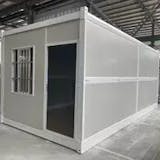Container homes have gained popularity as a sustainable and cost-effective housing solution. However, navigating the legal landscape for container homes can be challenging. This article explores the zoning regulations and requirements for container homes in Ashburn, VA, and provides insights into the benefits and considerations of owning a container home in this region.
Zoning Regulations for Container Homes in Ashburn, VA
-
Permits and Approvals
- Before constructing a container home, you must obtain the necessary permits and approvals from the local government. This includes building permits, zoning approvals, and possibly environmental permits, depending on the location of your property.
-
Zoning Restrictions
- Zoning laws in Ashburn, VA, may restrict where container homes can be placed. It is crucial to check with the local zoning office to ensure your property is zoned for residential use and that container homes are permitted in your area.
-
Building Codes
- Container homes must comply with local building codes, which cover structural integrity, safety standards, and other construction requirements. These codes ensure that your container home is safe and habitable.
-
Homeowner Association (HOA) Rules
- If your property is part of an HOA, there may be additional rules and regulations regarding the construction and appearance of container homes. Review your HOA's covenants, conditions, and restrictions (CC&Rs) before proceeding.
Benefits of Container Homes
-
Cost-Effective
- Container homes are generally more affordable than traditional homes. They offer a budget-friendly alternative for individuals looking to own a home without incurring significant debt.
-
Sustainable Living
- Reusing shipping containers for homes promotes sustainability by reducing waste and minimizing the need for new construction materials. Container homes are also often designed to be energy-efficient.
-
Quick Construction
- The construction process for container homes is faster compared to traditional homes. Containers are prefabricated, which reduces construction time and allows for quicker occupancy.
-
Customizable
- Container homes are highly customizable. You can design your home to fit your specific needs and preferences, from the layout and interior design to the choice of materials and finishes.
Considerations Before Building a Container Home
-
Site Preparation
- Proper site preparation is essential for the stability and longevity of your container home. This includes leveling the ground, installing a foundation, and ensuring proper drainage.
-
Insulation and Ventilation
- Insulation and ventilation are critical for maintaining comfortable indoor temperatures. Proper insulation prevents heat loss in the winter and keeps the home cool in the summer.
-
Utility Connections
- Ensure that your container home can be connected to essential utilities such as water, electricity, and sewage. Plan for these connections during the design and construction phases.
-
Financing and Insurance
- Financing a container home can be different from traditional homes. Explore your financing options and ensure that you can obtain the necessary insurance coverage for your container home.
Conclusion
Owning a container home in Ashburn, VA, offers numerous benefits, from cost savings to sustainable living. However, it is essential to understand and comply with local zoning regulations and building codes to ensure a smooth construction process. By doing thorough research and planning, you can enjoy the unique and innovative lifestyle that container homes provide.
FAQs
| Question | Answer |
|---|---|
| What permits are required for building a container home? | You need to obtain building permits, zoning approvals, and possibly environmental permits from the local government. |
| Are container homes allowed in all areas of Ashburn, VA? | Zoning laws may restrict where container homes can be placed; check with the local zoning office for specific areas. |
| Do container homes need to comply with building codes? | Yes, container homes must meet local building codes to ensure safety and habitability. |
| How can I find out if my property is zoned for container homes? | Contact the local zoning office or check their website for zoning maps and regulations. |
| What are the benefits of owning a container home? | Benefits include cost-effectiveness, sustainability, quick construction, and high customization potential. |
| What considerations should I keep in mind before building a container home? | Site preparation, insulation, ventilation, utility connections, and financing are key considerations. |








